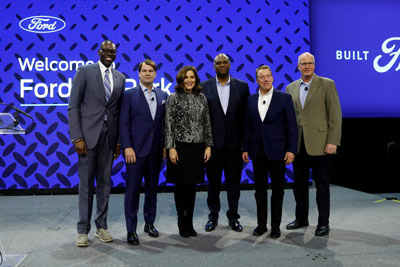Should Michigan taxpayers foot $700,000 per job created for 2,500 jobs at the new Ford factory that will pay an average wage of $45,136?
That’s the question Michigan lawmakers will soon decide for the BlueOval Battery Park in Marshall.
The $3.5 billion factory aims to drop the cost of electric vehicles via lithium iron phosphate batteries and pump out 2 million vehicles globally by 2026. The factory will be funded by at least $1 billion in taxpayer funds. The state asked for another $750 million to prep the site, bringing the total taxpayer cost to $1.75 billion.
Only 90 new jobs would be created in 2023---60 technical jobs and 30 managerial jobs. The plant expects to create 2,500 jobs in year three when the average wage would be $45,136 across managers, craftsmen, technical and professional workers.
In a news release celebrating the deal, Gov. Gretchen Whitmer said the investment would create “2,500 good-paying jobs” that will build Michigan’s economic momentum.
Michael LaFaive, a policy director of the Mackinac Center for Public Policy, cited an Upjohn Institute for Employment Research study that concluded between 75% and 98% of all subsidized investments would have happened without the subsidy.
“That means in a best case scenario the majority of corporations receive a form of windfall profits courtesy of taxpayers,” LaFaive wrote in an email.
“Rather than directing precious resources toward large firms the state should just let all businesses and people keep more of what they earned,” LaFaive wrote. “We’d all be better off with an across-the-board income tax cut or better transportation system than with another publicly subsidized, for-profit corporation.”
Only 25,181 electric vehicles are registered in Michigan. This Ford plant aims to drop the average cost of EVs from $65,291, according to Kelley Blue Book as of September 2022.
Meanwhile, the average price for a gas-powered vehicle was $48,100. Moreover, many used gas-powered cars cost between $5,000 and $15,000.
The $750 million in additional funding would include $330 million to the Michigan Department of Transportation for road improvements; $224 million for pad-ready site improvements; $100 million for water and wastewater improvements; and $75 million for land acquisition. Other projected spending includes $15 million for Norfolk Southern rail improvements; $5 million for building inspections; and $300,000 to fund fiber optics.
Rep. Donni Steele, R-Orion Township, said $1.75 billion of taxpayer money could be spent better to benefit all taxpayers.
“It’s time to utilize state resources in a capacity that benefits all Michigan residents---such as fixing crumbling roads and bridges in communities throughout our state,” Steele said in a statement. “These hundreds of millions of dollars should be used to proactively bolster Michigan’s future, instead of continuing to fund reactionary pet projects.”
Ford Motor Company hasn’t yet responded to a request for comment.
Michigan economic development representatives and Marshall City Manager Derek Perry say the factory will be key in creating jobs in an area that’s lost 2,000 jobs over the last 20 years.













